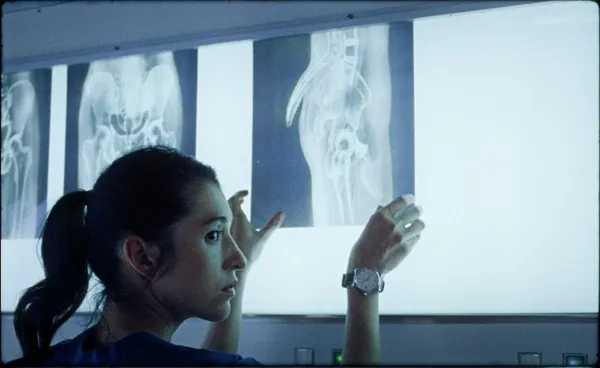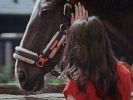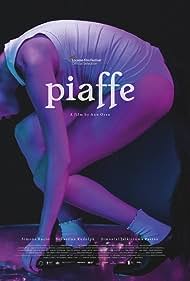Eye For Film >> Movies >> Piaffe (2022) Film Review
Piaffe
Reviewed by: Jennie Kermode

It’s sometimes described as one of the first images in cinema: a figure atop a horse executing a piaffe, prancing in place. We see it in the zoetropes which preceded the earliest moving pictures, and it’s a recurring motif right through the first half century of film. We see a modern version projected on to a loose piece of cloth at the end of Zara’s Foley room wall, but Zara (Simon(e) Jaikiriuma) is not there. Following a mental breakdown, they have been institutionalised, leaving their sister Eva (Simone Bucio) with the responsibility for finishing their work. The hauntingly silent rider needs accompanying sound.
That Eva’s first attempt is a disaster should come as no surprise. Exploring the room, trying out the assorted shoes, rocks, bits of chain, sand and hay, she delivers only a crude approximation of the proper sounds, in part because she has no real experience of horses. Told to get some, she heads out to the stables to meet Moviestar, the huge stallion who stars in the advert she’s working on. This is one of several scenes in which director Ann Oren takes advantage of Bucio’s slight stature to suggest that she doesn’t quite fit into the world. It’s not that she’s diminished, exactly, just that she is failing to connect, as if she were designed for something else. Nonetheless, the encounter with Moviestar sparks some kind of change. Like a method actor getting into a role, she begins to pick up her subject’s behaviours. A snuffle here, a little movement of the foot there, and before she knows it, her body has sprouted a long equine tail.

Seeking greater understanding, Eva connects with botanist Dr Novak (Sebastian Rudolph), whom we have seen at the start observing images of ferns through a peepshow-like device which will go on to manifest as the exterior of a giant zoetrope. There’s an old fashioned, steampunk aesthetic to the thing, all polished brass and dark, varnished wood, which contrasts with the delicacy of the living plants. In a demonstration, Novak uncoils youthful fronds, pinning them in position with blue string as if engaged in a sort of botanical kinbaku. It’s a hint at what is to come, as he and Eva engage in a series of intense encounters which involve the eroticisation of her tail.
Oren captures these scenes exquisitely, portraying eroticism without the need for to-camera frontal nudity, keeping the emphasis on the performances and on Eva’s experience. Like the serendipitous appearance of reminders scattered along one’s course through the world when one is falling in love, everything keeps coming back to horses; there is even a horseshoe-shaped building with a lake at its centre like the water which often accumulates in equine footprints on country lanes. In keeping with the theme, Oren is also highly attentive to sound, sensitising us to the smallest changes – and naturally, given this dual preoccupation, the old sound designers’ in-joke about horses’ own erotic expressions is in there (the default whinny which you’ll hear in practically every film with horses is actually a stallion’s way of saying that he fancies a shag). The film remains self aware, witty and alert to its absurdities even as Eva lets go and allows her new experiences to overwhelm her.
Diving into the animal has other effects on Eva, bringing her closer to Zara and boosting her general confidence. The film contains two nightclub scenes, some distance apart, which allow us to observe how she has changed. The advert featuring Moviestar is for Equili, a mood stabiliser, yet Eva seems to feel more stable, more certain of herself, as she gives way to her moods. Meanwhile, Novak is experiencing his own journey, entranced by Eva’s growing power. Rudolph’s carefully restrained performance lets viewers appreciate the torturous experience of a dom who knows that he is losing the very control which makes him appeal to the object of his desires.
With a final scene which connects Eva’s transformation more directly to explorations of gender, gender roles and sexuality, Piaffe isn’t shy about its ideas, but it never feels heavy handed. Full of beautifully observed details, it’s as sensual as it is provocative, and makes room for its characters to unfurl naturally. Meanwhile, like the lenses in that mysterious room, Oren’s technique brings into focus what was there all along, just out of sight. The piaffe may be a performance, movement going nowhere, round and round within the magical wheel, but only until the horse comes to recognise its power.
Reviewed on: 12 Aug 2023
















